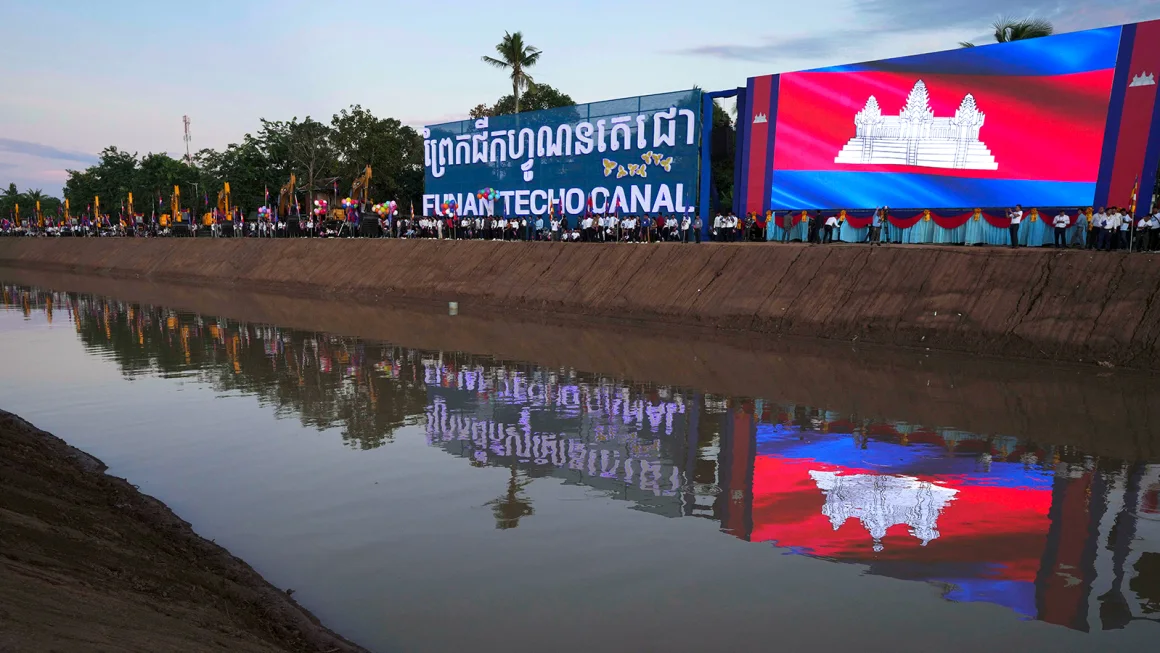
Cambodia Breaks Ground on Controversial $1.7 Billion Canal Funded by China
Prek Takeo, Cambodia — Cambodia has officially started construction on the controversial Funan Techo canal, a $1.7 billion project funded by China. This 180-kilometer (111 miles) canal aims to connect Phnom Penh, the nation’s capital, with Kep province on the southern coast, providing direct access to the Gulf of Thailand. Despite the economic benefits, the project has sparked significant environmental concerns and may strain relations with neighboring Vietnam.

Economic Ambitions and Strategic Partnerships
The Funan Techo canal, which will be 100 meters (328 feet) wide and 5.4 meters (17.7 feet) deep, is expected to significantly reduce shipping costs by providing a direct route to Cambodia’s sole deep-sea port in Sihanoukville. This project underscores China’s significant influence in Cambodian politics and the economy. The canal’s development is seen as a strategic move to decrease Cambodia’s reliance on Vietnamese ports, a shift that has Vietnam apprehensive about the potential economic and environmental impacts.
Environmental Concerns and Regional Implications
Environmentalists have raised alarms about the canal’s potential effects on the Mekong River, which is crucial for millions of people across six countries due to its vital role in fisheries and agriculture. The US-based Stimson Center has highlighted the potential for “significant transboundary impacts” on water availability and agricultural productivity in Vietnam’s Mekong Delta, where 90% of Vietnam’s rice exports originate.
Vietnam’s Quiet Concerns
While Vietnam has expressed concerns about the canal’s impact on its Mekong Delta rice production and the possible diversion of Cambodian exports from Vietnamese to Cambodian ports, it has done so quietly. Nguyen Khac Giang, an analyst at Singapore’s ISEAS-Yusof Ishak Institute, notes that Vietnam’s reticence stems from the “complex historical legacy” and a desire not to appear as infringing on Cambodia’s sovereignty.
Political and National Significance
The canal project also appears to be a strategic move by Cambodia’s ruling elite to bolster support for Hun Manet, who succeeded his father, Hun Sen, as the country’s leader last year. The government declared Monday, which coincided with Hun Sen’s birthday, a national holiday to encourage public participation in the groundbreaking ceremony. Thousands of people, wearing t-shirts with images of the father and son, gathered at the site, which was adorned with Cambodian flags and billboards promoting the canal’s economic benefits.
Chinese Involvement and Control
Despite concerns, the Cambodian government is pushing forward, emphasizing that the canal will be jointly constructed by Chinese and Cambodian companies, with the latter holding a 51% majority share to maintain control. The Chinese state-owned China Road and Bridge Corporation has been contracted to build the canal.

International and Regional Dynamics
Cambodia’s close relationship with China is evident in numerous Chinese-funded infrastructure projects across the country. Nearly 40% of Cambodia’s over $11 billion foreign debt is owed to China. This partnership has also played a role in dampening criticism of Beijing within the Association of Southeast Asian Nations (ASEAN), where several members, including Vietnam, have territorial disputes with China in the South China Sea.
In June 2022, Cambodia and China initiated a naval port expansion project, raising concerns from the U.S. and other countries about the potential for a Chinese military outpost on the Gulf of Thailand. While Hun Sen has denied allegations of granting China the right to establish a military base at the Ream Naval Base, the strategic implications of these developments continue to be closely watched.



